Spark/Chihi - 19 - any pronouns - I'm not very active anymore, but asks are always open!
Don't wanna be here? Send us removal request.
Text
voice acting as a profession is so funny because you'll see someone being like "voice actors need to be paid better! like [obscure person you've never heard of]" and you're like "oh I wonder who that person is, maybe I've heard them voice a character" and you look it up and it turns out they voice 137 characters in Futurama and 94 characters in The Simpsons and 96 characters in Adventure Time and every one of the My Little Ponies and 27 characters in Arcane and 96 characters in Kim Possible and 4 characters in Phineas and Ferb and 296 characters in Dexter's Laboratory and all of the main cast of Fairly Odd Parents and at least 6 characters in every Pixar movie and almost every animated depiction of Superman and 473 SpongeBob characters and they've been in every installment of Mass Effect and Halo and The Elder Scrolls and Fallout and Call of Duty and they were in Star Trek and Law & Order and they were 12 characters in the MCU and they also invented t-shirts and the colour green and they got paid a sum total of $3.27 and a mothball for all of it combined. then you go burn down David Zaslav's house with him inside
#I fuckin love EN voice actors man. Closest thing to a long-term special interest I have#But god do I wish the industry actually cared about them#Even more so when it comes to anime if I have to see one more person talk shit about dubs I will personally haunt them#reblog
30K notes
·
View notes
Note
Elvis are you immortal ?
Woah mama my time in the desert has made me immune to the sands of time
17K notes
·
View notes
Text

#This happened to my buddy Yuji Itadori once#Happy birthday to my favorite little freak of nature <3#reblog
8K notes
·
View notes
Text

How 50 year old white women at the farmers market will be staring at you while you browse their husbands woodwork
3K notes
·
View notes
Text

all because you wanted to play pretend
#Been having Anthy thoughts lately. She's such a good character I love her so so so much#utena#reblog
2K notes
·
View notes
Text
discourse about redemption arcs would vastly improve if instead of always asking “is this character redeemable?” people started asking “what message would it send to redeem this character?” and “would it be logical or satisfying on a narrative level to redeem this character?”
#Found this in my likes and honestly the Doloris pfp adds so much to this. Can't wait for the Uika crashout#tropes#reblog
35K notes
·
View notes
Photo



Junpei’s revelation
751 notes
·
View notes
Text

do you get my vision
#my boy is not weak he just keeps getting pit against actual legends#<- prev tags#SO glad someone else sees the vision OP. I'm obsessed with this#Jogo and Yanqing are stronger than I cause if I was subject to the constant whims of the Worf Effect I'd just give up and go home#JJK#HSR#reblog
86 notes
·
View notes
Text
basically, i think the general rule of thumb is: if someone REALLY wants the blood that’s inside of your body, and they’re like… a vampire, or a dracula, or some sort of mansquito, then that’s probably okay. a dracula and a mansquito are made for removing things like blood and swords from inside your body. that’s basically fine.
if something wants to get at your blood, and they’re, say, some kind of murdersaurus, or maybe a really big frog, that’s where the problems start to arise. a really frog is not made for removing blood, and your blood knows this, which is why it is so vehement about wanting to stay IN your body instead of coming out.
unfortunately this will not deter a really big frog, because a really big frog is full of things like prizes, and value, and quite a lot of hatred, and it would REALLY rather like to replace any and all of those things with your blood, and basically by any means possible.
492K notes
·
View notes
Text

i didnt want to draw this. the idea was haunting me for days, demanding to be drawn into physical existence. i am so sleep deprived
6K notes
·
View notes
Text
Headcanon: Since Kiryu is 48 and has spent nearly a quarter of his life in prison, he isn’t the best selfie taker.

34K notes
·
View notes
Text
Speaking of Ray Chase, knowing he voices Gabriel in Malignant and having seen the movie and knowing what it's about becomes funny to me when considering the Twin Theory about Sukuna and Yuji and their relationship in canon.
#YES THIS EXACTLY. I just watched the movie and yeah the twin theory didn't end up being true after all but still super insane connection#lf I had a nickel for every time Ray Chase played a fucked up twin who controlled a family member's body I'd have two nickels#Which isn't a lot but it's weird that it happened twice#Gabriel's like a bratty little brother who keeps on asking for a turn on the Xbox except he already had a turn 20 minutes ago#JJK
25 notes
·
View notes
Text

Shout out to @spark-keys for showing me this tweet
479 notes
·
View notes
Text

So I finished the first half of Scarlet Nexus
#Doing Kasane's route now and this is definitely the game ever#revue starlight#scarlet nexus#karen aijo#karen travers#spark.sht
19 notes
·
View notes
Note
How are we feeling about ensekai’s emu3 translation!!! (I’m mad)
(if you remember the 3 whole posts i made when asahi got de-gayed on EN you'll know i am mad too and that this is probably going to get long)
i don't like to be too cynical but it was so obvious that they were going to change that line, i had a feeling since the event first released on JP and after the incident with Asahi where I went through and tracked down multiple other examples of EN removing queer subtext it became clear to me that in no way shape or form was "emu-chan really loves nene-chan" making it to EN without getting changed. what i didn't expect was them changing Nene's line after Luka's comment, which actually makes this whole situation far worse than many of their other instances of toning down queer subtext.
for anyone who isn't aware of what happened, in chapter 5 of the current Emu event, there's a scene where Nene, Rui and the Virtual Singers are talking about what would cheer Emu up. The vsingers all talk about how much Emu loves spending time with Nene, leading to the following exchange
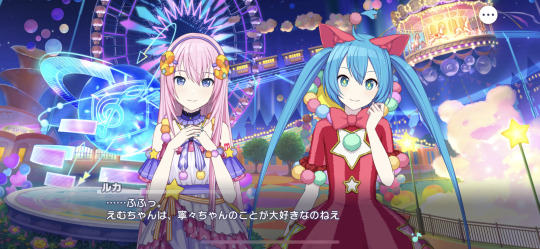
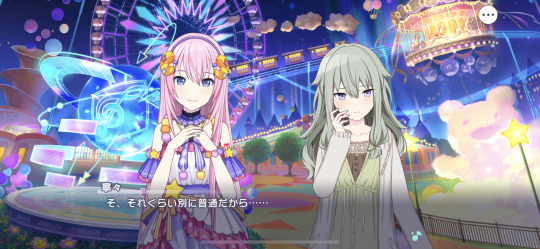
If you look for them, any fan TL of this scene will be something similar to this:
Luka: ...Fufu. Emu-chan really loves Nene-chan, doesn't she? Nene: Th-that's nothing special...
EN's official translation is this:
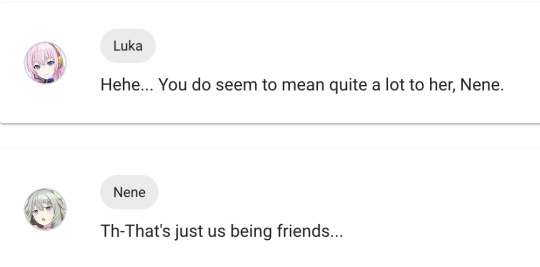
So what's the issue? I'll start with Luka's part. In the original text, she uses the word daisuki, which can mean to "like a lot" or "love". It's a word you will see frequently in the idol/idol-adjacent genre of games, due to its ambiguity in that it can be read as either platonic or romantic when used towards a person, and often will be used in ambiguous situations so that it's harder to confirm the writers' intentions either way. so here, fans of the emu/nene ship could view the fact that emu loves spending her time with nene as more on the romantic side, but people who don't like the ship could view it as platonic and move on.
while they didn't translate daisuki directly, Luka's line still works, and still contains the ambiguity that works as ship tease in the original text. it's a perfectly fine localisation that still conveys the original intent. despite that, there is something to be said about EN's consistent refusal to translate daisuki as love in most instances when it's not used on An/Kohane (but then again, EN has literally teased An/Kohane on their twitter account so is it all that surprising?).
Here's some examples:
Aibou no koto ga daisuki de / he loves his partner -> he cares about his partner very much (The Power of Unity chapter 7 when Kaito is comparing Arata to Akito and Toya)
HARUKA-CHAN, DAISUKI DAYOOOO!!! / HARUKA-CHAN, I LOOOOOVEEE YOU!!! -> You're the best!!! (Dear Me, As I Was Back Then chapter 4 when minori is at an ASRUN concert. this one isn't actually that great of a localisation)
Honachan no koto daisuki dakara. Kore de iinda yo. / I love Honachan, so this is fine. -> I want what's best for her. And this is it. (Leo/need main story chapter 14 after Saki tells Honami she won't bother her anymore)
Minna daisuki de - taisetsuna tomodachi na no / I love them all - they're my dearest friends -> They're all amazing, and very dear to me. (Leo/need main story chapter 17. this isn't good either)
What's particularly amusing about that last one is that there's a second official translation for it that I assume was done by JP staff (since EN never promoted doing the Journey to Bloom subs like they did back when they provided subs for Petit SEKAI) that actually keeps the word daisuki as love.

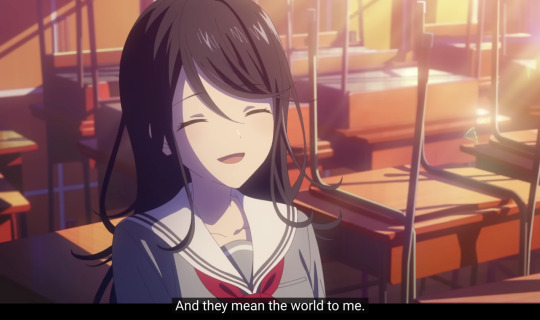
Yeah. I love all my friends - and they mean the world to me.
It's a better localisation than the official EN team one.
Questionable localisation choices aside, Luka's line is fine and is actually in line with the original. The issue with this localisation very much lies with Nene's part, because that is an entirely new line.
In the original text, Nene's "that's just normal" or "that's nothing special" or however you choose to TL it, is meant to be her questioning Luka's statement, since all the things that the other vsingers said that Emu liked were pretty normal things like going shopping and playing video games with nene. To Nene, these things are normal activities for them to do together, so she gets embarrassed by the fact that Luka concludes from that information that Emu loves Nene. When I dissect it like that I think you can really tell what the writers were going for here lol.
"That's just us being friends" does still convey the idea that Nene thinks these activities aren't anything out of the ordinary and she isn't sure why the vsingers are picking these out as some of Emu's favorite things to do, but it's very different from the original line. "But those are just normal things we do together" is something I just came up with on the spot, but it's a lot closer to the original text and still conveys the same meaning. The fact they changed the line to "that's just us being friends" is, honestly, not even subtle that they're covering up queer subtext. The original scene was very clearly written in as ship tease, and EN mentioning "friends" for no reason, especially since the word nor anything close to it was not used in the original, is instantly a red flag because it's like the go-to for queerbaiting and censorship. This was intentional. There was no need for them to specify that the relationship is platonic, Luka's part is ambiguous for a reason so that fans can view it how they like.
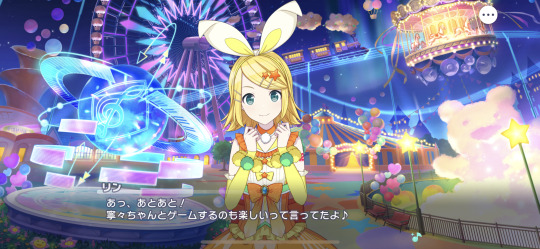
Just to top all this off, here's Rin's original line just before that Luka+Nene interaction:
Oh, and! And! She said that playing games with Nene-chan is also super fun!
And here's Rin's line from the official EN translation:

That's not the same thing, but even more weirdly, the incorrect part (super fun->really loves) is a correct translation for the part changed in Luka's line. So, they can do it, they are willing to say "really loves", just not in the right places. Maybe because Rin's part is less personal than Luka's part? It's strange actually, this isn't the first time they've done this either. Off the top of my head I can think of an example from Shiho's Varied Kindness 2* story where they translated the word "suki" as really loves, despite that being much stronger than the original word used (and the fact that daisuki is used a lot in the Leo/need stories and it's incredibly rare if not entirely unknown for them to translate it correctly).
It's not subtle that they're trying to remove implications of the characters possibly being queer, they did it in curtain call and they did it in walk on and on, and multiple times before then too. And considering some of the content in this year's events and the amount of times they say daisuki alone, it's gonna keep happening. honestly i hate the fact that i keep trying to justify the translations in these posts. these translations are intentional. what happened in the curtain call translation back in october says enough. when a character who uses explicitly romantic language towards another guy passes as a straight character in the translation you know they're doing it on purpose.
oh and once again, it's only the EN server that has this issue. The scene in question was translated almost word-for-word on the TW and KR servers.
read fan translations. they're better than what EN gives us and people put a lot of effort into them.
384 notes
·
View notes
Text
look at this loser. he looks like he moans when he wipes his asshole [remembers not to be homophobic] But he’s married to a woman [doesn’t want to sound too congratulatory] An ugly woman [doesn’t want to be misogynistic] With a great personality [doesn’t want to sound too congratulatory] Who moans when she wipes her asshole. [satisfied smirk]
26K notes
·
View notes
Text
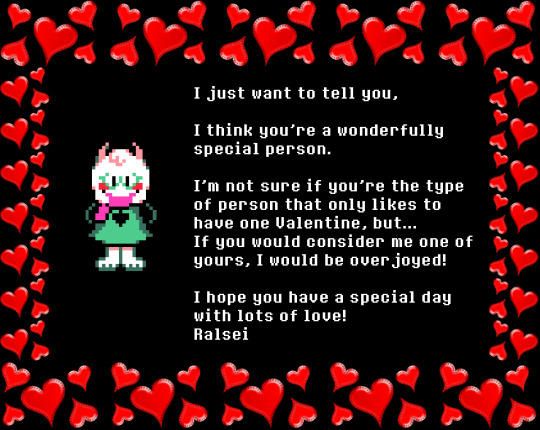

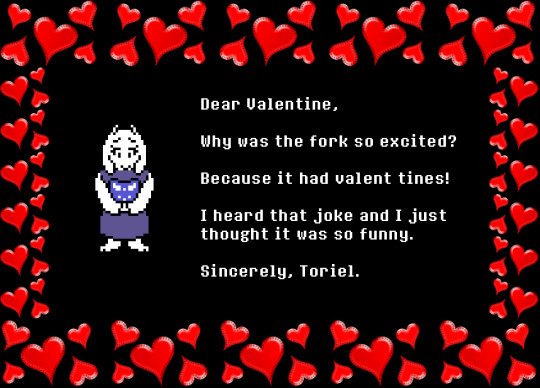



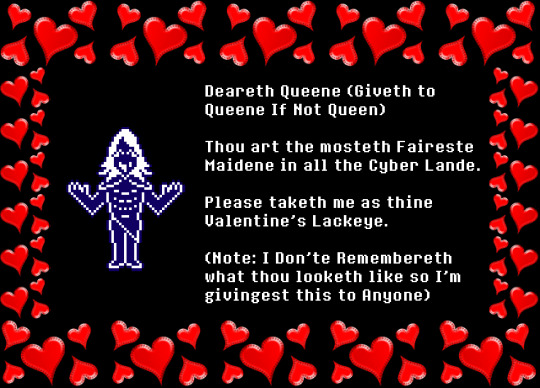




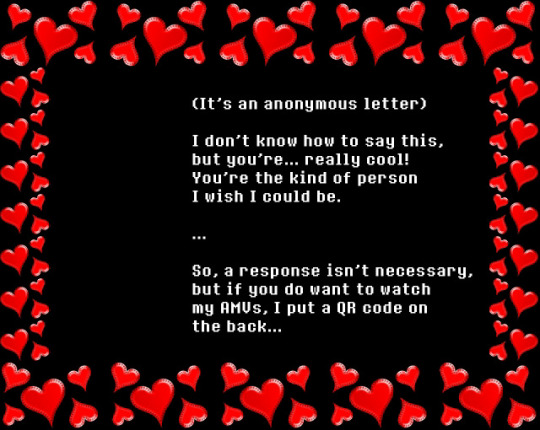


















I believe I have collected every single Valentine card showcased in the newsletter shuffle! Thank you so much to everyone who sent theirs in for this post <3 (1/2)
16K notes
·
View notes